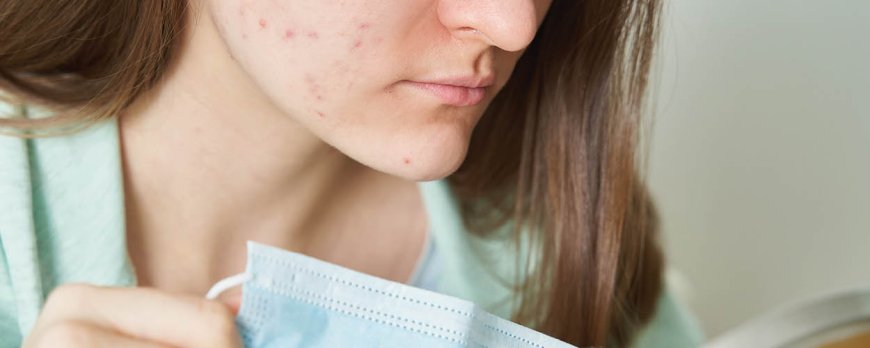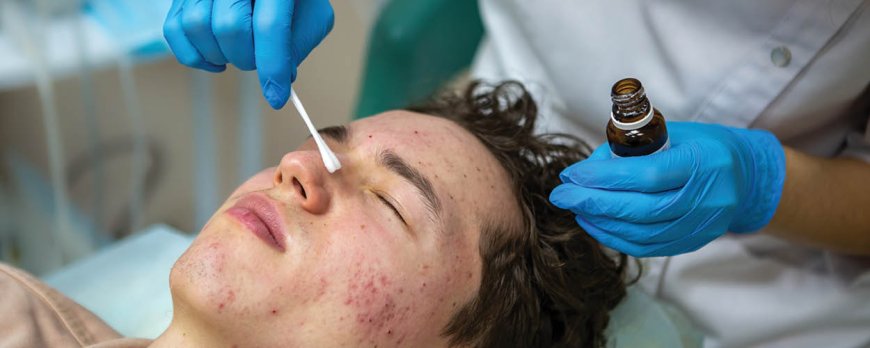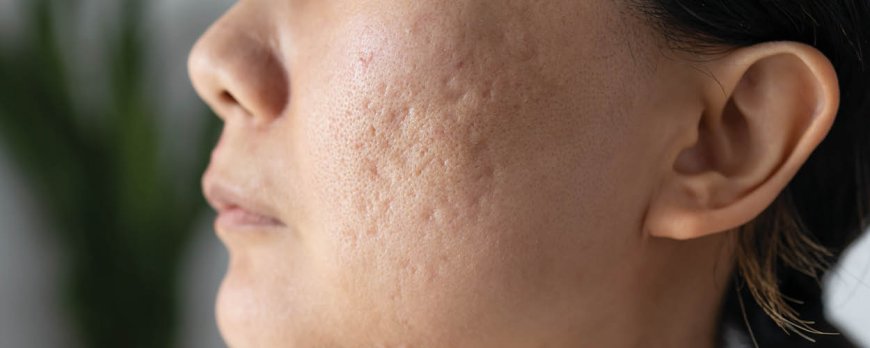How can I tell what type of acne I have?
Unsure about your acne type? Our guide on 'How can I tell what type of acne I have?' helps you identify your acne type for effective treatment options.

How can I tell what type of acne I have?
If you're unsure about the type of acne you have, it's essential to know the different types of acne lesions and their characteristics to determine the most suitable treatment for your skin. By understanding the various types of acne, you can identify the specific type of blemish you are dealing with and make informed decisions about how to address it.
Key Takeaways:
- There are different types of acne, including comedones, papules and pustules, nodules, and cysts.
- Comedones are non-inflammatory acne lesions that can be closed (whiteheads) or open (blackheads).
- Papules are small red bumps that may be tender to the touch, and pustules are inflamed pimples filled with pus.
- Nodules are large, firm bumps that develop deep within the skin and can be painful.
- Cysts are pus-filled lesions that resemble boils and can be larger in size.
Understanding Different Types of Acne
Acne can present itself in different forms, and understanding the specific characteristics of each type can help in identifying your acne type accurately. Common types of acne include comedones, papules and pustules, nodules, and cysts.
Comedones: Comedones are non-inflammatory lesions that can be either closed (whiteheads) or open (blackheads). Closed comedones appear as small bumps beneath the skin's surface, while open comedones have a black or darkened surface due to oxidation. These types of acne blemishes are caused by clogged hair follicles and can typically be found on the face, forehead, and chin.
Papules and Pustules: Papules are small red bumps that are inflamed and may be tender to the touch. Pustules, on the other hand, are inflamed pimples filled with pus. These types of pimples often occur in clusters and can be found on the face, chest, and back. The presence of pus indicates an infection, and it is important to avoid picking or squeezing these acne lesions to prevent further inflammation and scarring.
Nodules and Cysts: Nodules are large, firm bumps that develop deep within the skin. They are often painful and do not contain any visible pus. Cysts, on the other hand, are pus-filled lesions that resemble boils and can be larger in size. Both nodules and cysts are considered severe forms of acne and can lead to long-term scarring if not properly treated. It is essential to seek professional dermatological intervention for these types of acne and avoid self-treatment.
Understanding the different types of acne and their characteristics is crucial in determining the most effective treatment options. While over-the-counter products can be helpful in mild cases, severe forms of acne may require prescription medications and professional dermatological interventions. Consulting a dermatologist can provide personalized guidance on identifying your acne type and selecting suitable treatment options for optimal results.

Comedones: Whiteheads and Blackheads
Comedones are common acne lesions that can be classified as either closed or open, known as whiteheads and blackheads, respectively. These non-inflammatory acne blemishes form when hair follicles become clogged with dead skin cells, oil, and bacteria.
Key characteristics of comedones:
- Closed comedones (whiteheads): These are small, flesh-colored bumps that appear as clogged pores with a white or yellowish plug. They are covered with a thin layer of skin and do not have an opening to the surface.
- Open comedones (blackheads): These are similar to closed comedones but have a dark appearance due to the exposure of the clogged pore to air. The oxidation of melanin, the pigment responsible for skin color, gives blackheads their characteristic dark hue.
While both closed and open comedones may be present on the skin at the same time, they are considered to be mild forms of acne. These blemishes can often be treated with over-the-counter products containing ingredients such as salicylic acid or benzoyl peroxide.
If left untreated or if the skin becomes irritated, comedones can progress to more inflammatory forms of acne, such as papules and pustules. It is important to practice good skincare habits and seek professional advice if experiencing persistent or severe acne.
Papules and Pustules
Papules and pustules are common forms of acne that are characterized by red, inflamed bumps on the skin's surface. These types of acne lesions typically occur when the hair follicles become clogged with excess oil, dead skin cells, and bacteria. The accumulation of these substances leads to inflammation and the formation of papules and pustules.
Papules are small, raised bumps that can range in size from a pinhead to a pencil eraser. They are usually pink or red in color and may be tender to the touch. On the other hand, pustules are similar in appearance to papules but have a white or yellow center filled with pus. This pus is a mixture of dead skin cells, bacteria, and white blood cells that have gathered to fight the infection.
Causes of Papules and Pustules
- Excess oil production
- Buildup of dead skin cells
- Bacterial growth
- Inflammation and irritation
Papules and pustules can be triggered by hormonal changes, such as puberty or menstrual cycles, as well as external factors like stress, certain medications, and the use of comedogenic skincare products. It is important to avoid picking or squeezing these types of acne lesions as it can worsen inflammation, increase the risk of scarring, and spread the infection to other areas of the skin.

Nodules: Understanding a Severe Form of Acne
Nodules are a severe form of acne that manifests as large, firm bumps deep within the skin and can cause considerable pain and discomfort. These deep-seated acne lesions are different from other types of acne, such as comedones or papules, due to their size and the level of inflammation they provoke. Nodules can develop when the hair follicles become clogged with excessive oil, bacteria, and dead skin cells, leading to the formation of stubborn, inflamed bumps beneath the skin's surface.
Characterized by their size and tenderness, nodules can often be felt as hard, persistent bumps. Unlike more superficial types of acne, attempting to squeeze or extract these nodules can be extremely painful and may cause further inflammation and scarring. The severity of the pain and discomfort associated with nodules is often a distinguishing feature that sets them apart from other forms of acne.
Possible Complications of Nodules
- Scarring: Due to their deep-seated nature, nodules often lead to the development of scars, which can persist long after the acne itself has resolved.
- Psychological Impact: The physical appearance and persistent pain of nodular acne can have a significant impact on a person's self-esteem and overall emotional well-being.
- Long-Term Effects: If left untreated or improperly managed, nodules can potentially cause long-term damage to the skin, leading to hyperpigmentation, texture irregularities, and ongoing acne flare-ups.
If you suspect that you may be experiencing nodular acne, it is crucial to seek professional dermatological advice. A dermatologist can accurately diagnose the type and severity of your acne and determine the most effective treatment options for your specific situation. This may include prescription medications, such as isotretinoin, and other interventions tailored to address the underlying causes of nodular acne.
Remember, each person's acne is unique, and finding the right treatment approach for your specific acne type is essential for achieving optimal results. Consulting a dermatologist will not only provide you with personalized guidance but also help minimize the risk of complications and support the overall health and appearance of your skin.
Cysts
Cystic acne is a severe type of acne that forms deep within the skin, resulting in large, painful, and pus-filled lesions that resemble boils. Unlike other types of acne, cysts can cause significant discomfort and can leave behind deep scars if not properly treated.
The distinguishing feature of cystic acne is the formation of nodules filled with pus. These nodules develop when the hair follicles become clogged with dead skin cells, oil, and bacteria. The buildup of these substances causes inflammation, leading to the formation of painful cysts.
Treating cystic acne requires a comprehensive approach that may include both topical and oral medications. Topical treatments containing ingredients like benzoyl peroxide or salicylic acid can help reduce inflammation and kill bacteria. Prescription medications such as retinoids or antibiotics may also be prescribed to target the underlying causes of acne.
In severe cases, dermatologists may resort to drainage or injection procedures to alleviate pain and reduce the size of the cysts. These interventions should only be performed by a qualified professional to minimize the risk of scarring and infection.
Seeking Professional Advice
If you're uncertain about your acne type or have severe acne symptoms, it is recommended to consult a dermatologist for an accurate diagnosis and personalized treatment plan. Acne can vary greatly in its presentation, and a professional dermatologist can provide expert guidance to determine the specific type of acne you have.
A dermatologist will examine your skin and assess the severity of your acne. They may also ask about your medical history and any medications or skincare products you currently use. Through this comprehensive evaluation, they can identify the underlying causes of your acne and tailor a treatment approach that targets your specific concerns.
Accurate Diagnosis and Personalized Treatment Plan
During your consultation, the dermatologist may use specialized tools to examine your skin more closely and identify the type of acne lesions present. These tools may include a magnifying glass, a Wood's lamp, or even a skin biopsy in more complex cases.
Once a diagnosis is made, the dermatologist will devise a personalized treatment plan that may include a combination of topical treatments, oral medications, and professional interventions. They can guide you in selecting the most suitable treatment options based on the type and severity of your acne.
Remember, seeking professional advice is crucial in effectively managing acne. Dermatologists have the expertise and knowledge to accurately diagnose your acne type and provide tailored treatment options that can help improve your skin's condition. Don't hesitate to schedule an appointment for a thorough assessment and expert guidance for your acne concerns.
Tailored Treatment Approaches
Knowing your specific acne type is crucial as it helps in selecting tailored treatment approaches that can effectively address your skin concerns. Different types of acne require different treatment strategies to achieve optimal results. Here are some effective treatment options for the various types of acne:
- Comedones: For closed comedones (whiteheads) and open comedones (blackheads), topical treatments containing ingredients like salicylic acid or benzoyl peroxide can help unclog pores and reduce excess oil. Regular exfoliation and avoiding pore-clogging products can also prevent their formation.
- Papules and Pustules: Inflamed pimples can be treated with topical medications that contain ingredients such as antibiotics, retinoids, or azelaic acid. These products can help reduce inflammation and kill acne-causing bacteria.
- Nodules: Deep-seated, painful acne bumps like nodules may require professional dermatological intervention. In some cases, corticosteroid injections or oral medications may be necessary to effectively treat these stubborn lesions.
- Cysts: Cystic acne, characterized by large, pus-filled lesions, often requires prescription medications like oral antibiotics, isotretinoin, or hormonal therapy. Professional extraction or drainage may also be needed for severe cases.
It's important to note that over-the-counter treatments and home remedies may not be sufficient for severe or persistent acne. If your acne is causing significant distress or is unresponsive to self-treatment, consulting a dermatologist is highly recommended. A dermatologist can provide a tailored treatment plan based on your specific acne type, severity, and medical history.
Remember, acne is a complex skin condition, and it's essential to approach its treatment with patience and consistency. Following a proper skincare routine, avoiding triggers like excessive sun exposure or touching your face, and maintaining a healthy lifestyle can also complement the effectiveness of your chosen treatment approach.

Over-the-Counter Treatments
Over-the-counter acne treatments can be a viable option for milder forms of acne and are readily available as topical creams, gels, and cleansers. These products often contain active ingredients that target specific acne-causing factors, such as excess oil production, clogged pores, or bacterial growth. When choosing an over-the-counter treatment, it is important to consider your skin type and specific acne concerns.
Here are some key points to keep in mind:
- Look for ingredients: Effective over-the-counter acne treatments commonly contain ingredients such as benzoyl peroxide, salicylic acid, or sulfur. Benzoyl peroxide works by killing bacteria and reducing oil production, while salicylic acid helps unclog pores and exfoliate the skin. Sulfur has antibacterial properties and can help reduce inflammation.
- Consider your skin type: Some acne treatments may be more suitable for oily or combination skin, while others are designed for sensitive or dry skin. It is important to choose products that are formulated for your specific skin type to minimize potential irritation or dryness.
- Follow a consistent skincare routine: To maximize the benefits of over-the-counter acne treatments, it is essential to use them as directed and maintain a consistent skincare routine. Cleanse your face twice a day, apply the treatment product evenly, and moisturize to help balance the skin's moisture levels.
If you have persistent or severe acne that does not respond to over-the-counter treatments, it is recommended to consult a dermatologist. A dermatologist can provide personalized guidance, assess your specific acne type, and prescribe stronger medications or recommend professional interventions.
Prescription Medications and Interventions
Severe acne may require prescription medications and professional dermatological interventions to effectively manage the condition and prevent long-term scarring. A dermatologist can assess the severity of your acne and develop a personalized treatment plan tailored to your specific needs.
Prescription medications commonly used to treat acne include topical retinoids, which help unclog pores and reduce inflammation. Oral antibiotics may also be prescribed to combat acne-causing bacteria and reduce inflammation in severe cases. Dermatologists may recommend hormonal therapies for individuals with hormonal acne, such as oral contraceptives or spironolactone.
In some cases, professional dermatological interventions may be necessary to address severe forms of acne. These interventions may include procedures like chemical peels, laser therapy, or extraction of deep acne cysts. Dermatologists can determine the most suitable intervention based on the type and severity of your acne.
It's important to note that prescription medications and interventions should be used under the guidance of a healthcare professional. Your dermatologist will monitor your progress and make any necessary adjustments to your treatment plan to ensure the best possible outcome.
Conclusion
Identifying your acne type is crucial for determining the most suitable treatment options and achieving clearer, healthier skin. Different types of acne, such as comedones, papules and pustules, nodules, and cysts, have unique characteristics that require specific approaches for effective management.
Comedones can be closed (whiteheads) or open (blackheads), and understanding their causes and appearance can aid in their prevention and treatment. Papules and pustules are inflamed pimples, and recognizing their presence can help address the underlying inflammation and reduce the risk of scarring.
Deeper within the skin, nodules can form, leading to painful, large bumps. Recognizing the signs of nodular acne is essential for preventing complications and seeking appropriate interventions. Similarly, cysts are pus-filled lesions that resemble boils and may require specialized treatment to address their unique characteristics.
Consulting a dermatologist is highly recommended for a professional diagnosis and personalized guidance on the most effective treatment options for your specific acne type. They can assess the severity of your acne and recommend over-the-counter treatments, prescription medications, or dermatological interventions if necessary. Together, you can develop a tailored treatment plan to address your unique needs and achieve clearer, healthier skin.
FAQ
How can I tell what type of acne I have?
To determine what type of acne you have, it is important to understand the different types of acne lesions and their characteristics. Common types of acne include comedones, papules and pustules, nodules, and cysts. Consulting a dermatologist can help determine the appropriate treatment for your specific type of acne.
What are comedones?
Comedones are non-inflammatory lesions that can be either closed (whiteheads) or open (blackheads).
What are papules and pustules?
Papules are small red bumps that may be tender to the touch, while pustules are inflamed pimples filled with pus.
What are nodules?
Nodules are large, firm bumps that develop deep within the skin and can be painful.
What are cysts?
Cysts are pus-filled lesions that resemble boils and can be larger in size.
Do different types of acne require different treatment approaches?
Yes, different types of acne may require different treatment approaches. Severe forms of acne may require prescription medications and professional dermatological intervention.
Should I consult a dermatologist for my acne?
Yes, consulting a dermatologist can help determine the appropriate treatment for your specific type of acne and provide personalized advice.



































































































































